S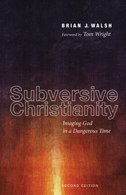 ubversive Christianity: Imaging God in a Dangerous Time Second Edition Brian J. Walsh (Wipf & Stock) $15.00
ubversive Christianity: Imaging God in a Dangerous Time Second Edition Brian J. Walsh (Wipf & Stock) $15.00
A few weeks ago the prominent mainline denominational magazine Christian Century did an interview with me, an honor in which we are still delighting. In that interview I was asked to name some authors that would appeal to the Century readership that they may not know well. I named the spiritual formation author Ruth Haley Barton, the Biblical scholar and philosopher of aesthetics Calvin Seerveld, and a few others they needed to edit out due to space constraints. I was quick to mention the astute and provocative writings of Brian Walsh. His several works are among my favorite books, each for different reasons.
I am not sure if Subversive Christianity, a small paperback published in 1992, was the first book on which I was invited provide feedback on the manuscript, or if it was the first book that mentioned me in the acknowledgements, but I think it was. So I feel pretty connected to this, and hope our friends and customers will take notice of this brand new edition. The first edition has been long out of print – until now, with this new reprinted, expanded version. My old copy was certainly one of my most prized possessions. That is, until I gave it away, or maybe sold it out from under myself. I’ve been personally awaiting this reprint for more than a decade!
The first edition of the book was published by a faithful little indie press, but was never well known. It was just four meaty chapters, each given as speeches or keynote talks, all delivered in the harsh Cold War years following the seminal Transforming Vision: Shaping a Christian Worldview, co-authored by Walsh with Richard Middleton in 1984. Brian was carefully reading Walter Brueggemann – your welcome, Brian, for turning you on to The Prophetic Imagination, which for some deluded reason I fancy having done, even though I suppose it isn’t even true, since you thank Richard Middleton for that lead. On some pages, Subversive Christianity could be called “Brueggemann-esque.” With a tone of lament and pathos and a profound belief in how the Biblical text can serve as a counter-narrative to imperial design, evoking a new imagination, it offers fresh energy to break out of the accommodated captivity of the people of God.
Transforming Vision, published by InterVarsity Press is still considered by many to be the best book on the development of a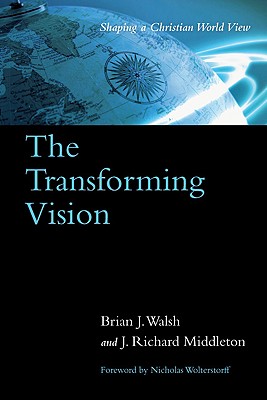 Christian worldview, and the socio-religious / cultural critique is strong there. (The brief history of dualism and rise of secular idols is exceedingly helpful.) But it becomes even more incisive and impassioned in Subversive… In some ways Walsh was following the journey of his favorite Canadian rock star, whose Humans and Inner City Front albums documented his shift from a pleasant, folkie vibe informed by his evangelical conversion (“Wondering Where the Lions Are” you know) to a multi-ethnic, urban neighborhood and the music’s increasing awareness of the deep brokenness in our lives, personally and culturally. Cockburn was singing more about “the falling dark,” about regret and toxic pollution, social injustice, his divorce, even as Walsh took up similar concerns. Brian was involved in the work of urban mission and public justice, trying to say no to the idols of the age (so clearly explained in The Transforming Vision) and immersing himself in the edgy discourse that eventually found voice in Truth Is Stranger Than it Used to Be (still the best book on postmodernism, and a must read for those interested in the pain of our times
Christian worldview, and the socio-religious / cultural critique is strong there. (The brief history of dualism and rise of secular idols is exceedingly helpful.) But it becomes even more incisive and impassioned in Subversive… In some ways Walsh was following the journey of his favorite Canadian rock star, whose Humans and Inner City Front albums documented his shift from a pleasant, folkie vibe informed by his evangelical conversion (“Wondering Where the Lions Are” you know) to a multi-ethnic, urban neighborhood and the music’s increasing awareness of the deep brokenness in our lives, personally and culturally. Cockburn was singing more about “the falling dark,” about regret and toxic pollution, social injustice, his divorce, even as Walsh took up similar concerns. Brian was involved in the work of urban mission and public justice, trying to say no to the idols of the age (so clearly explained in The Transforming Vision) and immersing himself in the edgy discourse that eventually found voice in Truth Is Stranger Than it Used to Be (still the best book on postmodernism, and a must read for those interested in the pain of our times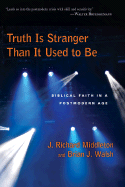 and an authentic gospel response.)
and an authentic gospel response.)
Eventually, this engaged pathos and socio-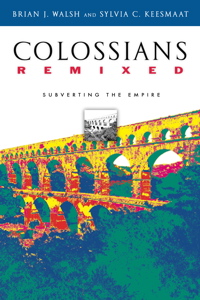 cultural resistance was explored in Colossians Remixed: Subverting the Empire (still the best commentary on Colossians, perhaps the best commentary on any Biblical book I’ve ever experienced reading!) Although separated by two decades it isn’t that big of a jump from the punchy, succinct Subversive Christianity: Imaging God in Babylon (catch that important sub-title) and the dense, wide-ranging, spectacular bit of analysis of the dislocating pressures of our nomadic culture in Beyond Homelessness: Christian Faith in a Culture of Displacement coauthored with Hope College environmental science professor, Stephen Bouma-Predigar.
cultural resistance was explored in Colossians Remixed: Subverting the Empire (still the best commentary on Colossians, perhaps the best commentary on any Biblical book I’ve ever experienced reading!) Although separated by two decades it isn’t that big of a jump from the punchy, succinct Subversive Christianity: Imaging God in Babylon (catch that important sub-title) and the dense, wide-ranging, spectacular bit of analysis of the dislocating pressures of our nomadic culture in Beyond Homelessness: Christian Faith in a Culture of Displacement coauthored with Hope College environmental science professor, Stephen Bouma-Predigar.
Subversive Christianity reveals a challenging style of faith that emerged from Walsh’s worldview studies at the Institute for Christian Studies, perhaps his frustrations with the more rigid dogmatism of some of the more strict Calvinists in his circles, his friendship with Dutch economist Bob Gouzdwaard and his brilliant work in reforming the fundamental assumption about economics and growth, his deep, deep love for the Bible, and his Cockburn-inspired poetic honesty about both (to cite Cockburn songs) the “Lord of the Starfields” and the rim of the “Broken Wheel.” That is, Walsh understood in those years, as now, both glory and pain, creation and fall, goodness and grief. (I don’t think I know anyone who reminds us of this so candidly, especially in recent years on his Empire Remixed blog from his current faith community at the University of Toronto and their Wine Before Breakfast services.)
deep love for the Bible, and his Cockburn-inspired poetic honesty about both (to cite Cockburn songs) the “Lord of the Starfields” and the rim of the “Broken Wheel.” That is, Walsh understood in those years, as now, both glory and pain, creation and fall, goodness and grief. (I don’t think I know anyone who reminds us of this so candidly, especially in recent years on his Empire Remixed blog from his current faith community at the University of Toronto and their Wine Before Breakfast services.)
As is clear in these four original chapters, Walsh thinks the true gospel of God’s Kingdom offers a radical deconstruction of the wrong ideologies and hurtful ideas and sinful structures that are the idols of our time and that have facilitated human folly and dysfunction and dis-ease. The reign of God – the journey out of exile and through the desert and towards a new Jerusalem – is the penultimate story (Christ, his Jubilee inauguration, his move towards the cross, his passion and resurrection being the ultimate story) which should shape the imaginations and lifestyles of the people of God, and such a drama is truly a subversive message. One cannot build a glad new world, or, more precisely, testify to its promised coming, unless one firstly renounces the grim news of the false gods, deconstructing and resisting the dominant narrative of the American dream and its bankrupt ideals. Which is to say this gospel story subverts the (ab)normal, frames our lives with new hopes and desires and dreams, which, of course, brings into greater clarity the cost of discipleship. Being counter-intuitive, counter-cultural, subversive, revolutionary, even, is hard. But such a discipleship, grounded in real life and real hope bears fruit in lasting, deep joy (even through shed tears.)
The shift from grief to hope, from Good Friday to Easter, isn’t easy, but it is the arc of the Biblical story, even though too many churches and Christian TV preachers and Christian books don’t push us too deeply to consider these things. This book helps us with that, immensely so.
In the first pages of Subversive Christianity Walsh confesses to not dealing much with suffering in Transforming Vision and this personal remark is important. Indeed, the third chapter, about grief and lament, was delivered the night of the death of a dear colleague, an IVCF staff worker at Brock University; again the pathos is palpable, as we lament the human condition, our own souls, and particularly the sadnesses of a culture bent on war and materialism, led by scholars and leaders who promote false hopes and harmful ideas. This critical demeanor, grounded in grief, is abundantly clear in Walsh’s feisty insistence that there is a malaise loose in the land, and that it is urgent to name it. And name it he does.
Transforming Vision and this personal remark is important. Indeed, the third chapter, about grief and lament, was delivered the night of the death of a dear colleague, an IVCF staff worker at Brock University; again the pathos is palpable, as we lament the human condition, our own souls, and particularly the sadnesses of a culture bent on war and materialism, led by scholars and leaders who promote false hopes and harmful ideas. This critical demeanor, grounded in grief, is abundantly clear in Walsh’s feisty insistence that there is a malaise loose in the land, and that it is urgent to name it. And name it he does.
From the false prophecy of uber-conservative intellectual Francis Fukuyama to the far left politics of Bruce Cockburn, Walsh draws on contemporary thinkers, artists, ideas and trends, to bring into focus the fundamentally subversive power of the Biblical texts that erode all false gods and upset all false hopes. These passionate, playful, creative, powerful sermons were worth their weight in gold, and became a life-line for some of us who rarely heard such evangelical faith proclaimed with such verve and guts. This wasn’t merely Marxist liberation theology, it wasn’t inspirational humanism or the incipient social gospel, this was full on evangelical Bible study, Christ-honoring, orthodox stuff. Walsh’s good friend Tom Wright wrote the foreword, saying it is a “powerful little book.” After extolling his study of contemporary culture and his patient academic work, Wright says of Brian, “he has also drunk deeply from biblical theology, and provides clear and creative exegesis of several passages in a way which breathes new life into them. Walsh brings together the Bible and the modern world in a way which is as original as it is compelling.”
This is exactly right, and these chapters do indeed bring together very insightful cultural studies and socio-political analysis with tremendous, exciting Bible exposition.
The first of the four chapters is titled “Imaging God in Babylon” about which he summarizes, “Christianity is a subversive cultural movement; the Christian community and worldview conflict; we are called to image God.” He offers a contextual rehearing of Genesis 1:26 – 28 that is nothing short of brilliant. I’m sure he thanks Richard Middleton for some of this (who later went on to write the magisterial Liberating Image: The Imago Dei in Genesis 1 which is now footnoted in the updated edition.) This chapter may be a seminal project for those that know the importance of Richard’s Liberating Image text and I’d guess they worked some of this out together. Brian preaches it really well! (And had nicely dedicated the book to Richard.)
Chapter two is called “Beyond Worldview to Way of Life: A Diagnosis.” Here he explores the “worldview/way of life gap.” There is a profound diagnosis of Western culture (by way of Cockburn’s song “The Candy Man’s Gone” and Bob Goudzwaard. Here, he invites a truly prophetic response and pushes us to realize that merely getting a new “worldview” – incanting stuff against dualism, affirming a wholistic gospel, realizing the connection between creation/fall/redemption and the like – simply doesn’t seem to carry the capacity to change lives and lifestyles. This frustrating gap between a multi-dimensional, Kingdom worldview and the way those who hold to such broad visions still live in the world – captive? — is named and explored. (Did Jamie Smith read this long before he cooked up his good stuff in Desiring the Kingdom and Imagining the Kingdom? Surely, yes, since Smith was with Walsh at the Institute for Christian Studies in those years. Smith’s criticisms about how some quarters define and explore worldview may be related to Walsh’s own concerns, preached so well, here.)
By the way, I think this talk was first delivered at the Jubilee conference in Pittsburgh. Besides dancing with Brian to “Brown Eyed Girl” that year, this talk was a true highlight in the history of great Jubilee talks.
The third chapter of Subversive… is “Waiting for a Miracle: Christian Grief at the End of History” and, as you might guess if you followed much-discussed books from those years, he contrasts the then-popular scholar Francis Fukuyma who released The End of History that year (and who has another new much-discussed wonky book out this month, by the way) at first with Bruce Cockburn’s song inspired by Central American peasants, “Waiting for a Miracle,” but then, surprisingly, in a brilliant section, with the true prophet, Jeremiah. This is a fabulous example of an incisive critique of a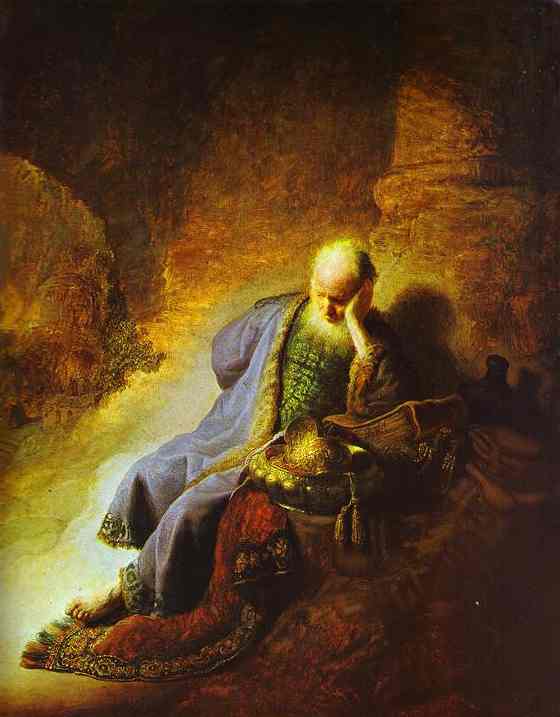 modern scholar and his role in shaping North American political and economic policy, and then a shift to profound Biblical lament.
modern scholar and his role in shaping North American political and economic policy, and then a shift to profound Biblical lament.
It is hard to say which of the chapters in this book is my favorite, but each offer profound insight, and reward repeated readings. And this one is stunning.
The last chapter is “Waiting for a Miracle: Christian Hope at the End of History” (notice the one-word switch in the sub-title.) In this chapter he cites Cockburn’s “pilloried saints” and Jeremiah (again.) I love the “real estate at the end of history” piece, about the stunt where Jeremiah buys land behind enemy lines, and how Brian uses that as a parable for our times. Wow! He insists we are all still “waiting for a miracle” but this time, with hope, hope that we can embody and live into.
I have to admit when we got the new edition in a week ago, I turned to this chapter first.
This brand new expanded edition offers a new chapter, oddly called a “post script” which offers much more than a post script, but which is a full on, serious piece. This new chapter brings us up-to-date and Jeremiah Mourns Over Destruction of Jerusalem Rembrandt
is called “Subversive Christianity 22 Years Later.” Here Brian asks “what time was it” and “what time is it?”
These questions about our social location and the ethos of the age sets him up for amazingly rich, thoughtful, Bible-infused social criticism,. (And, yes, Bruce Cockburn’s recent work comes in to play once again. Walsh has written a whole book on Cockburn, after all, so you can’t blame him using that rock poet as an inspiration.) I rarely say this about new editions, revised and updated books that have a meager new foreword or afterward, but I will now: even if you have the first edition, that thin black paperback, it is well worth it to get this new one, if only for this new last chapter.
My goodness, am I glad this new edition has been released! (The abstract oil painting on canvas on the cover isn’t given justice in the thumbnail above — it works well on the real cover and you should ponder it.) The new chapter is good – strident, passionate, honest, but yet full of Biblical hope. His work on Josiah (applied to the regime of President Obama, event) is fantastic, I think. Walsh amazes me; his ability to name gross sins and profound cultural disorientation, and yet call us to a joyful and upbeat kind of new way of life is unique.
Look, I read a lot of books (and many of you do too.) And most of us listen to a lot of speakers, take in weekly sermons. There is hardly anybody who writes or preaches like Walsh does, and I am more than happy to commend this — I am compelled to. It might shock you, you might not agree, you may be driven to ponder your own faith community and its cultural accommodation and the maturity of its prophetic imagination. I know this is touchy stuff, and I don’t mean to sound negative or critical, but the diagnosis and re-envisioning going on here is so very useful. You will be better for it, I am sure of it.
Here is the last paragraph of the last page of the new post script, Jeremiah Revisited, so to speak:
Build houses in a culture of homelessness. Plant gardens in polluted and contested soil. Get married in a culture of sexual consumerism. Make commitments in a world where we want to always keep our options open. Multiply in a world of dept. Have children at the end of history. Seek shalom in a violent world of geo-political conflict and economic disparity. This is Jeremiah’s word to the exiles. This is Jeremiah’s subversive word to us. And in this vision we just might see, with Jeremiah, a future with hope. (Jer. 29:11.) This is what is means to work and wait for a miracle. This remains at the heart of a subversive Christianity.
This was an inspiring, important, under-recognized book when it came out more than 20 years ago. It is a great grace that it is now available again, expanded just a bit, and I hope our friends and fans buy it, share it, study it, discuss it.
May its inspired, subversive resistance to the idols of the age motivate you to say no. May its joyful, costly hope of a cultural restoration based on Christ’s Kingdom coming motivate you to say yes. No and yes. Lament and hope. Guilt and grace. This book is a gift. Thanks be to God.
Brian’s meager royalties from this book, by the way, all go to our friends Rob & Kirstin Vander Geissen-Reitsma and their creative community development work through *cino and their Huss Project in Three Rivers Michigan.
TWO MORE, BRAND NEW:
ANOTHER NEW REPRINT AND A SET OF REFLECTIONS ON JOHN
Advent of Justice Brian J. Walsh, J. Richard Middleton, Mark Vander Vennen, Sylvia Keesmaat (Wipf & Stock) $10.00
I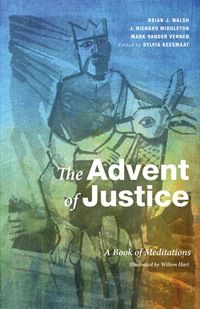 have long said that there is no other Advent devotional like this, nothing in print that comes close. It has been out of print for a few years, and we are glad it has been re-issued, with a nicer, full-color cover. (Otherwise, the inside, the handsome fonts and nicely designed pages with a few art pieces by Willem Hart remain.)
have long said that there is no other Advent devotional like this, nothing in print that comes close. It has been out of print for a few years, and we are glad it has been re-issued, with a nicer, full-color cover. (Otherwise, the inside, the handsome fonts and nicely designed pages with a few art pieces by Willem Hart remain.)
This is a set of 4 week’s worth of daily readings, studies of lectionary texts (mostly from Isaiah coupled with seasonal NT texts) with a serious contextualized reading of these passages. Some of the Isaiah passages are familiar to us while a few may be less so. The hard-to-pronounce names of kings and prophets, nations and armies, are made more clear, brought into focus so we realize what was going on, geo-politically and religiously among the divided kingdoms and such. That they invite us to ponder this and to apply the lessons to our own times, indeed our own lives, is a great holiday gift. It is not sentimental and there is nothing about Christmas ornaments or hot cider or snowy winterscapes. This is Bible study with cultural analysis. Dare I say it is an urgent antidote to some of the ways we’ve, well, you know… One friend who appreciated it a lot called it “Advent with a Vengeance.” Well, sort of.
I have read through these short pieces many times, and get something new with each reading. Walsh brings the big picture gospel to bear, as always, and Middleton especially explains the intricacies and drama of Old Testament politics. Mark Vander Vennen – an old pal and peace activist from our days in Pittsburgh, now a wise and respected family therapist – brings his own well-trained Old Testament scholarship to the plot, with very nicely written daily meditations, journeying with us as we wait expectantly. The last week New Testament scholar (and organic farmer) Sylvia Keesmaat eloquently brings it all together. Dr. Keesmaat, by the way, served as chief editor for this whole project, and brings the touch of a scholar and creative wordsmith.
This thin book is not light-weight, and for those not used to Old Testament prophetic literature, or for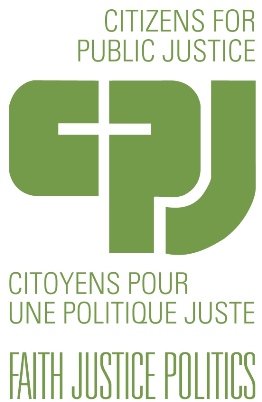 Advent being a time to inhabit the broad Biblical drama, this may even be challenging. Not surprisingly, it has some themes of social criticism, a faithful emphasis on justice and the common good, even as the texts point us towards these concerns. That Advent of Justice was firstly produced to commemorate the 40th anniversary of a Canadian social justice advocacy group – the Citizens for Public Justice (formerly the Committee for Justice & Liberty) – is fitting. Old heroes of mine, such as the late, great Gerald Vandezande, led that ministry for decades, and this little devotional reminds us of the rich Biblical heritage that served to shape CJL and CPJ. These authors live this stuff, and their own rich Biblical reflections have emerged out of their own engagement with issues in the public square, service to the marginalized, and taking stands for public justice and the common good.
Advent being a time to inhabit the broad Biblical drama, this may even be challenging. Not surprisingly, it has some themes of social criticism, a faithful emphasis on justice and the common good, even as the texts point us towards these concerns. That Advent of Justice was firstly produced to commemorate the 40th anniversary of a Canadian social justice advocacy group – the Citizens for Public Justice (formerly the Committee for Justice & Liberty) – is fitting. Old heroes of mine, such as the late, great Gerald Vandezande, led that ministry for decades, and this little devotional reminds us of the rich Biblical heritage that served to shape CJL and CPJ. These authors live this stuff, and their own rich Biblical reflections have emerged out of their own engagement with issues in the public square, service to the marginalized, and taking stands for public justice and the common good.
Still, even though this is dedicated to the justice activists and citizen advocates of CPJ and brings themes of justice to the fore, it is – let me be clear – an advent Bible devotional, short readings, day by day. They invites us to read the Bible text first, spend time pondering their explication, and then to return to the Bible text again, reading and hearing it with new eyes and ears. They do this to help us have a meaningful and joyous holiday season, to await well, to make time for God’s Word during Advent. They really do hope you have a good holiday season. May it help you wait well.
St. John Before Breakfast Brian J. Walsh and the Wine Before Breakfast Community (Books Before Breakfast) $18.00
W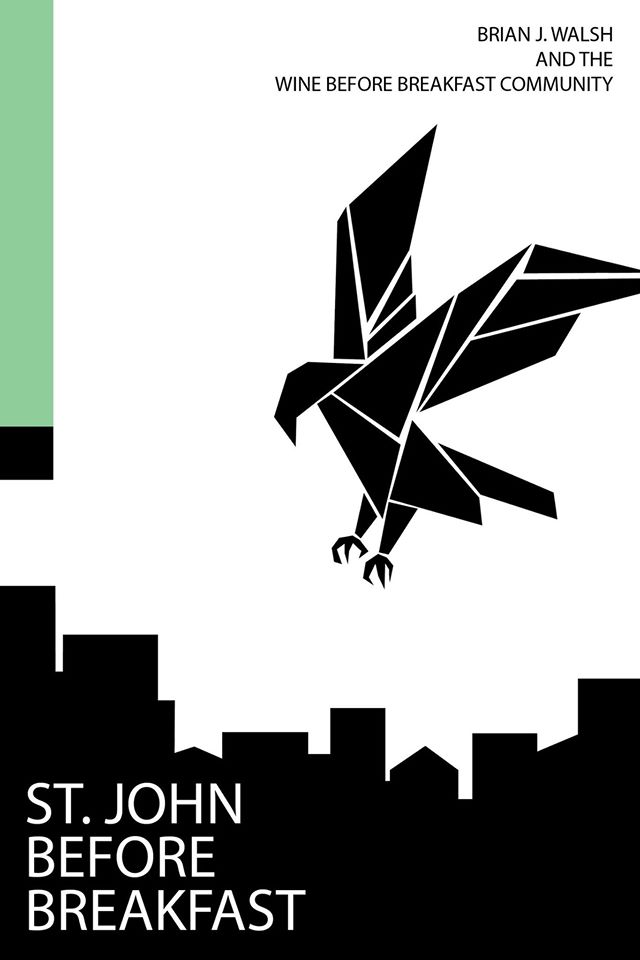 ow — we are just jazzed to tell you about this. We may be one of the very first bookstores to carry this, and it is an honor to be in on its distribution.
ow — we are just jazzed to tell you about this. We may be one of the very first bookstores to carry this, and it is an honor to be in on its distribution.
St. John Before Breakfast is a self-published set of studies/reflections done mostly by Brian Walsh for his “Wine Before Breakfast” early morning Eucharistic service among his rag-tag “Empire Remixed” community at the University of Toronto. Walsh is a campus minister for the Christian Reformed Church and has developed a band and worshiping community that meets before classes once a week (and others times, too, of course.) I have followed (as you may have) their “Empire Remixed” blog, and some of Brian’s poetic ruminations on the Scriptures there have been simply stunning. (This past summer they did a weekly reflection on the book of James which was some of the best stuff I’ve ever read from that popular New Testament prophet.)
Brian does a passionate and wise pastoral letter to his friends in the academic community at U of T right before Holy Week each year, inviting people to attend to spiritual practices that week – to read and re-read the gospel accounts, to attend church, to grief and wait and watch and pray as we move towards Resurrection Sunday and our joyful celebration of Christ’s Victory. It is my own Holy Week custom to read and re-read Brian’s letters and these are doubtlessly the best stuff I read every year.
And they remind us of the pathos and power and truth of Scripture.
Which is to say I am sure these Biblical ruminations – some written in free verses, as poetically delivered, live — will be potent, powerful, maybe a bit controversial, perhaps. As is his custom, he offers creative, contemporary exegesis of the Biblical text — yes, the gospel according to John — in engagement with pop culture. One week it is a set of Joni Mitchell songs, maybe Leonard Cohen, maybe Springsteen or U2 or Mumford & Sons. But mostly John, opened up and read and proclaimed with an edgy honesty. Walsh loves the Scriptures, believes the book is subversive and, properly opened up, God’s Word to subvert and challenge, heal and offer hope.
On the back cover it asks, “How does the Word made flesh take on new flesh in the urban heart of a city like Toronto? What happens when you allow the evocative narratives, symbols and imagery of this gospel to direct your prayers, shape your liturgy and transform your life?”
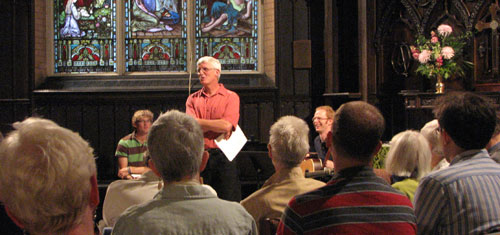
I can’t wait to read this self-published, handsome volume of “Wine Before Breakfast” Johannine messages. I hope you are curious, too.
Each chapter of St. John Before Breakfast includes an opening reflection, maybe a story, setting the stage, sometimes using the music or something from the news of the week) and then a homily on the passage. Many weeks there is a litany, a responsive reading, some sort of liturgical/poetic response. (These are very useful, by the way, and could be used or adapted in your own group or church service.) A few of the chapters are offered by other “Wine Before Breakfast” members and friends. It is truly amazing stuff and I am hard pressed to think of any other book quite like it.
This self-produced book is a fund-raiser for Walsh’s campus outreach there, and we are glad to be able to help him sell it. It is a nicely done project, not widely available. We hope that as you consider ordering Subversive Christianity or The Advent of Justice you will also consider picking up this, trusting that it will draw you into the extraordinary story John tells of this extraordinary Messiah, fully God, fully human, a suffering servant and healer of the cosmos. John, who points us to Jesus. A transforming vision, indeed.

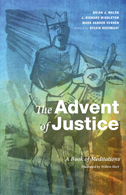
BookNotes
DISCOUNT
ANY ITEM MENTIONED
20% off
order here
takes you to the secure Hearts & Minds order form page
just tell us what you want
inquire here
if you have questions or need more information
just ask us what you want to know
Hearts & Minds 234 East Main Street Dallastown, PA 17313 717-246-3333

